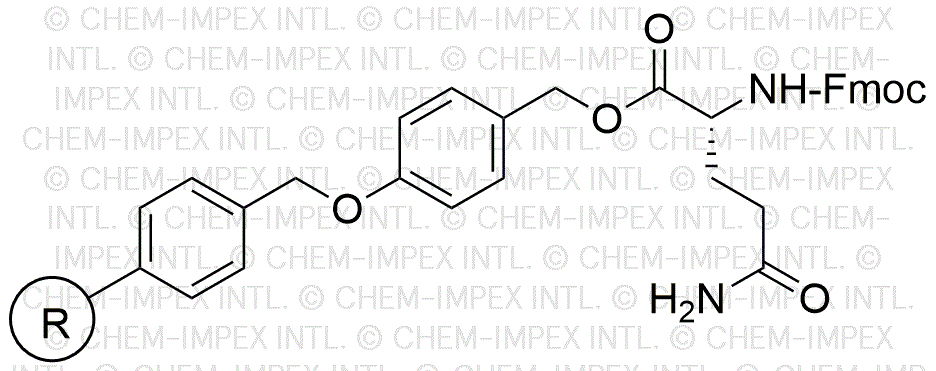Na-Fmoc-L-glutamine 4-alkoxybenzyl alcohol is widely utilized in research focused on:
- Peptide Synthesis: This compound serves as a protecting group in peptide synthesis, allowing for the selective modification of amino acids while preventing unwanted reactions. This is crucial for creating complex peptides in pharmaceutical research.
- Drug Development: Its role in drug design is significant, as it aids in the development of peptide-based therapeutics, which are increasingly important in treating various diseases, including cancer and diabetes.
- Bioconjugation: The compound is used in bioconjugation processes, where it helps attach biomolecules to surfaces or other molecules, enhancing the efficacy of drug delivery systems.
- Research in Neuroscience: It is applied in studies related to neurotransmitter pathways, where modifications of glutamine can help in understanding neurological disorders and developing targeted treatments.
- Analytical Chemistry: This chemical is utilized in analytical methods to study protein interactions and stability, providing insights that are essential for both academic research and industrial applications.
Información general
Propiedades
Seguridad y normativas
Aplicaciones
Na-Fmoc-L-glutamine 4-alkoxybenzyl alcohol is widely utilized in research focused on:
- Peptide Synthesis: This compound serves as a protecting group in peptide synthesis, allowing for the selective modification of amino acids while preventing unwanted reactions. This is crucial for creating complex peptides in pharmaceutical research.
- Drug Development: Its role in drug design is significant, as it aids in the development of peptide-based therapeutics, which are increasingly important in treating various diseases, including cancer and diabetes.
- Bioconjugation: The compound is used in bioconjugation processes, where it helps attach biomolecules to surfaces or other molecules, enhancing the efficacy of drug delivery systems.
- Research in Neuroscience: It is applied in studies related to neurotransmitter pathways, where modifications of glutamine can help in understanding neurological disorders and developing targeted treatments.
- Analytical Chemistry: This chemical is utilized in analytical methods to study protein interactions and stability, providing insights that are essential for both academic research and industrial applications.
Documentos
Hojas de datos de seguridad (HDS)
La SDS proporciona información de seguridad completa sobre la manipulación, el almacenamiento y la eliminación del producto.
Especificación del producto (PS)
La PS proporciona un desglose completo de las propiedades del producto, incluida la composición química, el estado físico, la pureza y los requisitos de almacenamiento. También detalla los rangos de calidad aceptables y las aplicaciones previstas del producto.
Certificados de análisis (COA)
Busque certificados de análisis (COA) ingresando el número de lote del producto. Los números de lote y de partida se pueden encontrar en la etiqueta de un producto después de las palabras "Lote" o "Lote".
Número de catálogo
Número de lote/lote
Certificados de origen (COO)
Este certificado de origen confirma el país en el que se fabricó el producto y también detalla los materiales y componentes utilizados en él y si se deriva de fuentes naturales, sintéticas u otras fuentes específicas. Este certificado puede ser necesario para cumplir con las normativas aduaneras, comerciales y regulatorias.
Número de catálogo
Número de lote/lote
Hojas de datos de seguridad (HDS)
La SDS proporciona información de seguridad completa sobre la manipulación, el almacenamiento y la eliminación del producto.
DownloadEspecificación del producto (PS)
La PS proporciona un desglose completo de las propiedades del producto, incluida la composición química, el estado físico, la pureza y los requisitos de almacenamiento. También detalla los rangos de calidad aceptables y las aplicaciones previstas del producto.
DownloadCertificados de análisis (COA)
Busque certificados de análisis (COA) ingresando el número de lote del producto. Los números de lote y de partida se pueden encontrar en la etiqueta de un producto después de las palabras "Lote" o "Lote".
Número de catálogo
Número de lote/lote
Certificados de origen (COO)
Este certificado de origen confirma el país en el que se fabricó el producto y también detalla los materiales y componentes utilizados en él y si se deriva de fuentes naturales, sintéticas u otras fuentes específicas. Este certificado puede ser necesario para cumplir con las normativas aduaneras, comerciales y regulatorias.

